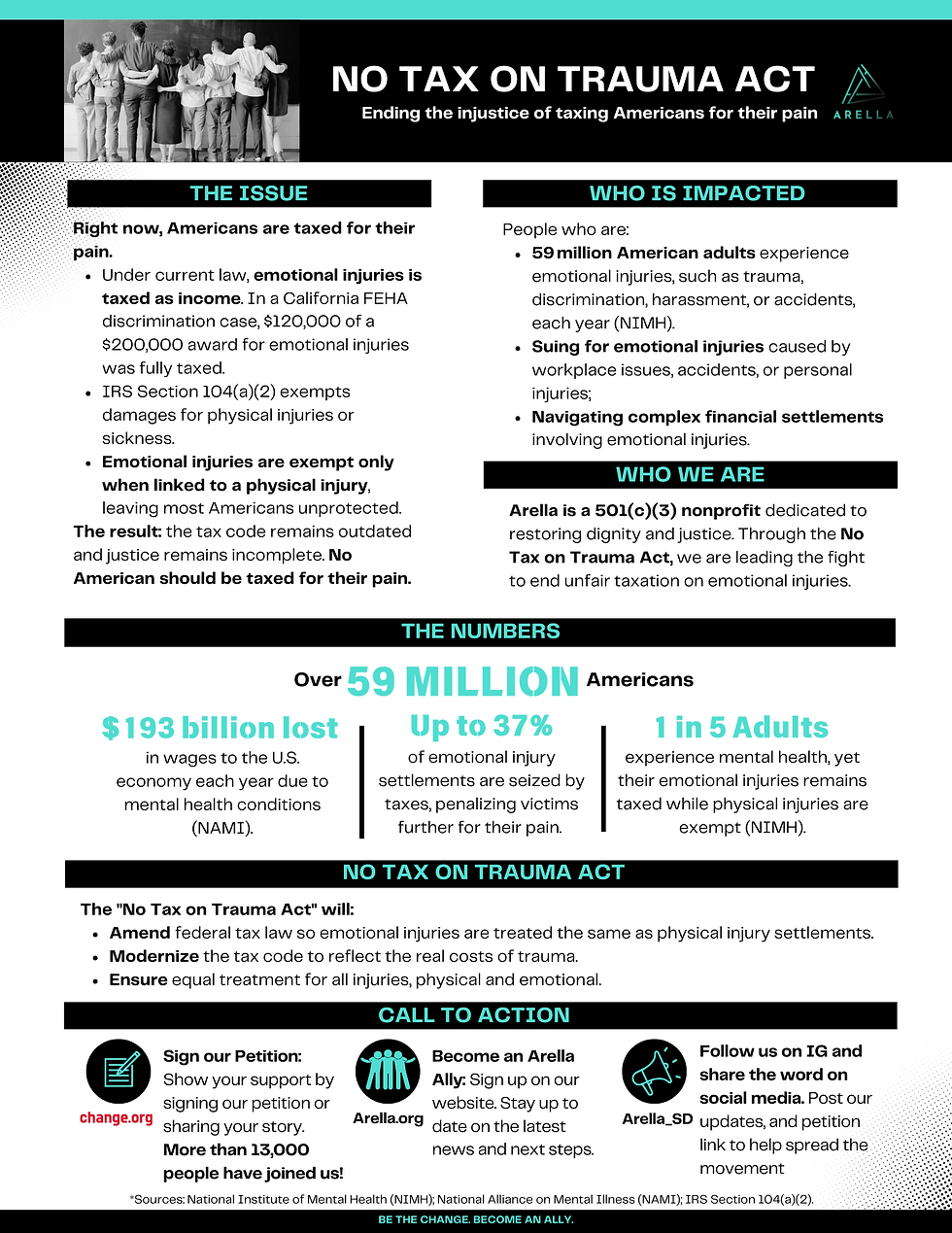No Tax on Trauma: What’s Next
- Kennette P
- Aug 23, 2025
- 3 min read
Updated: Aug 25, 2025
By Kennette Pen
August 24, 2025
America was founded on liberty, justice, and the promise that every person deserves fair treatment under the law. But what happens when you find the courage to pursue justice, survive the ordeal of a lawsuit, and win your case, only to discover that the IRS will seize a large portion of what was meant to help you heal? Would you still go through it?
Right now, the tax code protects physical pain but not emotional pain. In one California FEHA discrimination case, $120,000 of a $200,000 award for emotional distress was fully taxed. IRS Section 104(a)(2) exempts damages for physical injuries or sickness, yet emotional injuries are only exempt when tied to a physical injury. The result is an outdated tax code and justice that remains incomplete.
Lawsuits are never easy, especially for plaintiffs. Stepping into court means reliving painful experiences while every aspect of life is scrutinized. A single smiling photo can be used to argue that someone is “fine,” when in truth appearances tell us little about suffering. We saw this with the beloved actor Robin Williams, who brought laughter to millions yet faced mental illness so devastating it cost him his life. His story shows us that appearances can never reveal the true weight of emotional pain. To endure the totality of a lawsuit and finally win, only to watch a significant portion taken by taxes, is not justice.

America has always moved forward, leaving behind old ways of thinking and building stronger systems of justice. Once there was stoning, then there was due process. Each step reflected a new understanding of human dignity. Today, we face the same choice with emotional injuries. We can remain in the caveman days of dismissal, or we can recognize that mental pain is real, often as devastating as physical pain. The World Health Organization reports that depression is now the leading cause of disability worldwide, affecting more people than cancer or heart disease. And according to Brown University, since 9/11 veterans and active service members have died by suicide at a rate four times higher than combat deaths. Ignoring that reality in our tax code is no longer acceptable.
Why This Matters
Human history is the story of progress. We do not live in caves and we no longer cling to outdated ideas of justice. As Americans, we carry a responsibility to strengthen our nation by building a society that reflects truth, dignity, and fairness. Recognizing emotional injuries as equal to physical ones is not just sound policy, it is common sense, and it is justice.
I believe we share this responsibility not only as Americans but as human beings. Our duty is to raise the consciousness of society and move it toward a flourishing future rooted in dignity and justice. Economist Amartya Sen reminds us that justice is measured not only in laws on paper but in whether people can truly heal, recover, and live fully. And there is no such thing as a small step, only the step forward that must be taken.
Looking Ahead
This pursuit is bigger than one bill. It is about what kind of nation we choose to be. Do we cling to archaic codes that punish Americans, or do we move forward as a country that values both body and mind?
This is not only for survivors of sexual assault, No Tax on Trauma Act is for all Americans courageous enough to fight for justice who has sustained emotional injuries.
The No Tax on Trauma Act is our chance to take that step. Together, we can modernize the tax code, honor the reality of emotional injuries, and uphold the American promise that justice belongs to all of us.
Progress comes when people act. The time to act is now.
How You Can Help?
Sign the Petition: Join more than 13,000 Americans calling for change on Change.org. If this has happened to you, share your story when you sign. Your voice matters!
Share the Message: Post our one pager, graphics, and updates on social media to spread awareness.
Build the Coalition: We are gathering organizations, advocates, and community leaders to stand with us. Supporters may provide letters of support, and those who wish will be recognized on a coalition list on our website.
Contact Your Representatives: Urge your elected officials to learn about and support the No Tax on Trauma Act.
Issue Brief:






Comments